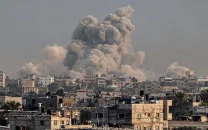Nawaz’s medical report submitted in IHC
The first medical board was convened on Oct 22 and second on Oct 23

Former prime minister Nawaz Sharif being shifted to hospital late Monday night. PHOTO: EXPRESS
"The special medical board is of the considered opinion that due to severe existent co-morbid conditions like diabetes mellitus, hypertension, hyperlipidaemia, hyperuricemia, chronic renal disease and ischaemic heart disease, the condition of the patient is critical and the current scenario of very low platelet count has added to the seriousness of nature of disease of his illness," says the summary of medical report.
The first medical board was convened on October 22 and the second on October 23.
Dr Tahir Shamsi of National Institute of Blood Diseases arrived on the same day (October 23) along with Dr Mahmood Ayaz.
The third special medical board was convened on October 24 for re-examination of Nawaz’s medication.
The board also decided to incorporate Dr Saqib Shafi of the Punjab Institute of Cardiology, Lahore for betterment management.
The report stated, “His [Nawaz’s] condition is critical. It is important to improve his platelet count to prevent internal hemorrhage but the increase in platelets can worsen his Unstable Angina. The board is of the opinion that his antiplatelet therapy can be resumed once platelets improve to 30,000.
As inquired by the court, travel may be considered once platelets improve to beyond 50,000 and his cardiac status allows.”
Head of the Board Dr Mahmood Ayaz also informed the IHC that the main risk and danger was regarding the rapid decline of platelets to 6,000 per microlitre.
According to him, further investigation would be possible only if the number of platelets been increased to 20,000 per microlitre. He was of the view that Nawaz must be protected first from external and internal bleeding, which also hampered some procedures to be carried out by the
medical board.
However, he expressed hope that within two to three days of treatment, Nawaz would be able to increase the number of platelets in his body.


















COMMENTS
Comments are moderated and generally will be posted if they are on-topic and not abusive.
For more information, please see our Comments FAQ